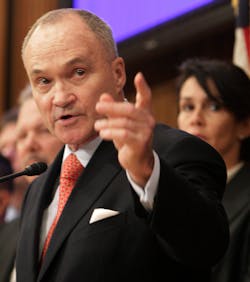NYPD Commissioner: Real Enemy is Illegal Handguns
The nation’s looming assault-weapons ban is plain common sense, NYPD Commissioner Ray Kelly said yesterday — but the city’s real enemy is illegal handguns.
“For us in New York City, and I believe in most urban centers throughout America, the problem really is concealable handguns,” Kelly said.
The city’s top cop made the remark on CBS’s “Face the Nation” during a discussion on Sen. Dianne Feinstein’s pending legislation to severely tighten restrictions on military-style firearms and high-capacity ammunition clips.
“We don’t want them on the streets, make no mistake about it,” Kelly said, referring to AK-47s and AR-15s, such as the one used in the Newtown, Conn., elementary-school massacre. “But the problem is the handgun.”
Handguns account for nearly all murders by firearm in New York City and state, data show. An analysis by the NYPD determined that assault weapons were used in just three of the 1,400 instances of gunplay in the city last year.
The biggest obstacle in stemming the flow of the illegal weapons — both assault rifles and handguns — is the less restrictive laws in other locales, Kelly said.
A universal background check would eliminate loopholes that allow these guns to be sold with virtually no questions asked and without documentation, he and other supporters say.
Responding to Kelly’s national call for action against handguns, Sen. Charles Schumer (D-NY) told The Post, “Whether it’s handguns or assault weapons, universal background checks will help prevent both from falling into the wrong hands.”
Such background checks are at the heart of the gun-control measures unveiled last week by President Obama — and the part of the proposal with the widest public support.
“Kelly is obviously right” about the background checks, said Matt Bennett, a spokesman for the Third Way, a centrist advocacy group that includes the Americans for Gun Safety coalition.
“We support an assault-weapons ban. There is no reason anyone should have these military-style weapons,” he said. “On the other hand, if you had to make a priority list, that is low on priority list.
“On the top of our list is universal background checks.”
Enacting the related background checks, however, won’t be easy, gun-control advocates warn.
“Fixing loopholes in laws that the NRA spend three and four decades revising won’t happen with one law,” said Ladd Everitt, a spokesman for the Washington, DC-based Coalition to Stop Gun Violence.
Obama separately said the gun-control community needs to have an honest dialogue with gun owners, especially those whose families have been hunting for generations.
“I think those who dismiss that [move] out of hand make a big mistake. Part of being able to move this forward is understanding the reality of guns in urban areas are very different from the realities of guns in rural areas,” the president said in an interview in the upcoming edition of The New Republic.
“So it’s trying to bridge those gaps that I think is going to be part of the biggest task over the next several months. And that means that advocates of gun control have to do a little more listening than they do sometimes,” he said.
Also during Kelly’s appearance on “Face the Nation,” the police commissioner acknowledged that the NYPD anticipates legal challenges to its experimental body scanner, which could detect hidden guns from afar.
“Sure, this is New York, no question about it,” the commissioner said. “We understand that there are Fourth Amendment issues here. New York is probably one of the most litigious societies in the world, and we have to be aware of that before we implement it.”
Republished with permission of The New York Post.
